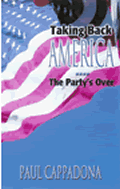Other Guest Articles:
Jury Rights! Jury
Nullification
Constitutional
Tools No
Longer Valid
DISPELLING THE MYTHS IN THE OWNERSHIP SOCIETY
By Phyllis Spivey
April
6, 2005
NewsWithViews.com
With headlines constantly broadcasting that first time home buyers have been priced out of the market, you may be surprised to learn that for some individuals, government is knocking down all the barriers. Bad credit? No down payment? Noncitizen? No problem. Government�s here to help. The happy ending is accomplished with your tax dollars.
Freddie Mac, a stockholder-owned company chartered by Congress and regulated by the federal government, makes it possible -- in association with Chase Home Bank and five national partners: ACORN (Association of Community Organizations for Reform Now); National Association of Hispanic Real Estate Professionals; National Association of Real Estate Brokers: National Association of Realtors and National Urban League. Potential home buyers work with local members of these groups plus other "partners."
The stated goal is to move minority and immigrant home buyers into housing, despite financial impediments that would normally disqualify buyers from obtaining mortgages. Freddie Mac calls these little impediments "myths," which is why their program is called, "Dispel the Myths" or "Homeownership. Let the TRUTH Move You."
Since most people with bad credit, no down payment, low income, and lacking citizenship, perhaps, would bypass the home buying market, Freddie Mac and the "partners" go out and bring them in. Working with communication experts specializing in minority outreach, Freddie Mac develops posters, door hangers, radio spots, and newspaper ads; local partners distribute the information at community meetings, housing fairs, churches, head start schools and on a one-to-one basis.
Preliminarily, the goal is to get people to a "Get the Facts" workshop, where the "myths" get dispelled. Offered in English and Spanish, the workshop class leads to a homeownership orientation, including financial and credit counseling, and a certificate, which is good for a year. At this point, the qualified buyer is paired with a Realtor. Program managers claim they can close an escrow in 30 days, once the certificate is granted.
Just how much is this program worth to a participant? Plenty. In August 2004, the Riverside, California Press Enterprise reported that many low income households could not afford the monthly payments on qualified houses, even with as much as $85,000 in available down-payment assistance that would not have to be repaid for decades, if ever. So, to make the program work, the city of Riverside added $40,000 to the down-payment assistance, thereby making as much as $125,000 in aid available to an individual family!
Total financing for the purchase can be as much as103 percent of the home�s value. That�s right, 103 percent � closing costs, you know. The buyer pays for a credit report. A Chase Home Finance "emerging markets" matrix shows a variety of loan options, adjustable and fixed, amortized for up to 30 years and as high as $333,700 or, with good credit, up to $422,300. The maximum purchase price depends on the program and source of funding. In the city of Riverside, it can be as high as $475,000.
It�s done with multi-layered financing from governmental sources at all levels � federal, state, city and county � with targeted affordable housing funds, redevelopment funds, block grant funds, and funds from various other programs, including Proposition 46, a $2.1 billion housing bond passed by California voters two years ago. Giving new meaning to "creative financing," some of the money comes in the form of loans, some of it in outright grants; either way, the funds can be used in combination, i.e., "multi-layered," for the homebuyer.
In the Riverside-San Bernadino County area, where the program is aimed at Latino and African American communities, and where proof of citizenship is not required, community partners also work with cities and developers to ensure construction of new affordable housing units. According to a program spokesman: "When the developer is going to come in and build 100 upscale units, we�re working with the city to convince the developer to set aside 20 percent of those units for low-to moderate housing. How do you subsidize the cost of that 20 percent?"
"It�s called inclusionary zoning," the spokesman continued. "That house might sell for $300 thousand; you don�t want to deflate everyone else�s market value, so the city will provide a big subsidy so the low-income buyer can purchase that home."
So the money flows, the "partners" consuming big chunks of it for their roles in advancing housing "opportunities," yet ever whining about insufficient funds. Even as the state Housing and Community Development agency distributes another $183 million for affordable housing programs, one community partner is pushing for a transfer tax on all real estate transactions in California; and Realtors are sponsoring legislation to require density bonuses for builders who include a percentage of units for low-income buyers in their projects.
Some partners have "multi-layered"agendas. ACORN, for example, works in more than 75 U.S. cities, but has gone international, operating in Peru and Canada and this year is opening offices in Mexico and the Dominican Republic. Besides "building community organizations of low-income families, and partnering with grassroots organizations outside of the United States," ACORN is "helping strengthen democratic movements for social change abroad, while continuing efforts to build power for immigrant communities in the United States."
But that�s not all. Sounding remarkably like Marxist organizers and lobbyists for illegal aliens, ACORN International says they�re "working to strengthen the local-global connections between ACORN members in the United States and low-income communities fighting for social justice in other countries, by focusing on issues shared by many communities, such as remittance policies, predatory lending, cross-border environmental justice and immigration reform." No doubt about it; ACORN would like to take "Dispel the Myths" international.
Just give it time. During the 2004 presidential campaign, George Bush�s reelection website promoted homeownership as yet another government entitlement, stating, "The President believes that every American should have the right to own his or her home.. "
Therefore, (according to the website):
"In his first term, the President set a goal to increase the number of minority homeowners to 5.5 million families by the end of the decade . . . President Bush signed the $200 million-a-year American Dream Down Payment Act, providing approximately 40,000 low-income families with funding assistance for down payments and closing costs. The Federal Government will insure mortgages for nearly 150,000 first-time homebuyers without a down payment. The Department of Agriculture is increasing home ownership with $2.7 billion in home loan guarantees for low-to-moderate income rural residents and $1.1 billion in direct loans for very low to low-income borrowers who are unable to secure a mortgage through a conventional lender."
Politicians babble incessantly about free markets and privatization, but they give us redistribute-the-wealth policies that jack up the housing market and keep home prices artificially high. What an insult to the millions of middle-class families who work and save, sometimes for many years, in order to buy their first home, while government confiscates their tax dollars to push others � including noncitizens � to the front of the line. Welcome to George Bush�s "Ownership Society."
� 2005 - Phyllis Spivey - All Rights Reserved
Sign Up For Free E-Mail Alerts
E-Mails are used strictly for NWVs alerts, not for sale
Phyllis is a researcher and freelance writer specializing in political analysis. She has been published in Lew Rockwell�s Rothbard-Rockwell Report, The Welch Report (on-line), The Orange County Register and is a regular contributer to The Sentinel Weekly News, Corona, California. She holds a Christian worldview and writes primarily on trade, economic, education, environmental, and immigration issues.
E-mail: SPIVEY2@infostations.com
In
the Riverside-San Bernadino County area, where the program is aimed at
Latino and African American communities, and where proof of citizenship
is not required, community partners also work with cities and developers
to ensure construction of new affordable housing units.












